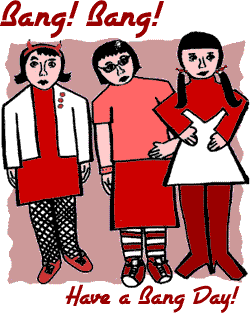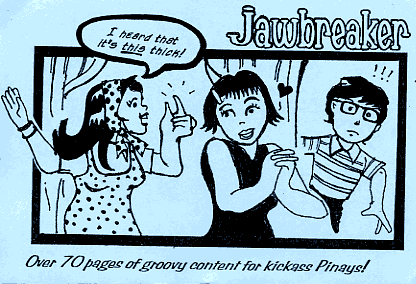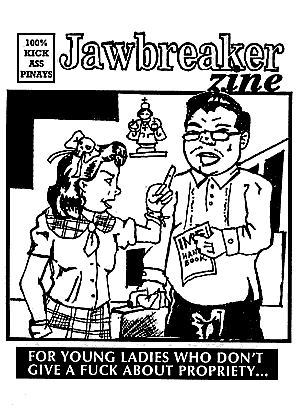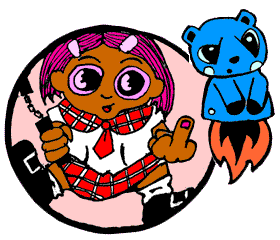
 |
| By
and for kick-ass Pinays: The zine Jawbreaker and distro Dumpling Press An
interview with Claire | |
|
|
Jawbreaker is run by Claire and Paolo of Dumpling Press, and is all about representing Filipinas in a smart, witty, and fun way. Check out their zine, distro and the interview we did! "Jawbreaker
is both a print and digital space by and for kick-ass Pinays -- and token boy-allies
-- who have a love/hate relationship with pop culture, both local and international.
It's a space for those of us who won't turn our backs on the so-called "fluff"
of pop media altogether, but refuse to give in to the brain-sucking, sugar-coated
crap that is pandered to us by corporate marketing scum. Yes, we might have a
bit more spending cash these days, but we use it on goodies that we have a passion
for. We defy the narrow sterotypes of young Filipinas as insufferable shop-a-holics
with a herd mentality, always looking out for the next hot item. We came-of-age
after the small victories of the "Cory years": better job opportunites
for women, more ways to explore our sexualities, wider access to media, etc. We've
grown up with the "cutesy" aesthetics of Sanrio, the outspokenness of
Kris Aquino, and the in-your-face attitude of Madonna, among others. We bring
these influcences with us, even now as we fight against the oppressions of this
globalized era: the packaging of Filipinas as "exotic" commodities,
the psychic chokehold of Western beauty standards, and the backwards-ass moralizing
value set that won't go away, like a nasty pimple that stays on your face long
after you've squeezed the pus out. We know enough to critique the fucked-up aspects
of the pop media we love so much. But we also take it a step further, claiming
the symbols and words for our ourselves, through zines, fan-fics, crafts, DIY
projects, even our conversations -- the art of everyday life itself. It's not
easy to produce content that addresses the complex and often messy realities we
face, as sassy, educated girls in a "developing" nation. But hey, we
love a good challenge!
That's why Jawbreaker aims to be a forum that's at once independent, queer-positive,
and proudly feminist." |
Can you tell me first of all a little bit about yourself? How old are you, where are you originally from and where do you reside now? Claire: I'm 28, and I've lived in Manila (Philippines) all my life. It's a pretty hot city, but when it rains, it pours. The beaches are our tourist attractions. I hate the beach, tho. I'm a city girl who likes going to the rock shows and artist-run gallery openings. What
do you do besides your zine and distro? Claire:
Dumpling Press has been around for a lot longer than Jawbreaker, like 5 years.
We put out the first issue of Jawbreaker over a year ago, but prior to that, we
had been entertaining the idea of a feminist pop culture zine for a couple of
years. We initially wanted to make Jawbreaker a website, but we loved the print
medium so much that we decided to incorporate elements of the old zine (Halo-Halo)
and approach feminism with something that we could relate to the most - our fascination
with girl culture and its radicalizing potential. | |
| We liked the idea of copping the teen magazine aesthetic, and considering how dumbed-down the medium is, we wanted to incorporate the look and feel of it and churn out prose that didn't underestimate our readers - something smarter, critical and with a bit of kookiness. Teen magazines have a way of presenting their shit in the most fucked up of ways, and often unironically, so we wanted to take the piss out of that by doing it our way. Plus we focused on issues, topics or subject matters that were of interest to us and hoped that other people would be interested to read about them, too. More
on Dumpling Press - it's first and foremost our publishing company, where most
of our zine work is released under. We decided to branch out into a distro, albeit
informally, coz we wanted to make zines more accessible to people who wanted to
read them but were not necessarily participating in a music scene like punk. But
for us, the distro aspect was more like tabling at shows or seeking in-store distribution.
|
|
Setting up a mail order distro didn't work with us. It seems that unless people are somewhat familiar with DIY culture, they'd be less inclined to send money for a zine or a CD and would settle for a face-to-face. But geographically, we're separated by islands/regions where meeting up would be near impossible unless you plan to travel, so mail order may be one recourse for that - something we'd have to consider and maybe work on, coz our zines have been, for the most part, Manila-centric. Working as a team is not as easy as it sounds. I can imagine how hard it would be to work alone and do all the projects + all the networking involved. As a team, we designate tasks like who handles the distro or who follows up with zine contributors, or who does the art and layout , or who edits the zine. Paolo's been more of the layout person, and I usually do my share of the writing, tho lately, I've been doing some drawing, so I've been contributing a little more than usual to the aesthetic of Jawbreaker. We always make joint decisions about what goes in the zine, and we give each other feedback on the stuff we're working on. We do most of the writing on our own time - when we're not spending time together, that is! I guess we're lucky that we can work well together and that we're willing to spend X no. of hours on our zine projects. How
do Jawbreaker and Dumpling Press complement each other? On what kind of zines
is your distro focusing? Claire:
Because of Jawbreaker and the release of two new girl-authored zines (Illiterati
and San'to?), we kinda decided to spring the distro back from inactivity. Our
priority, of course, is in-store distribution to places that are supportive of
zines and other DIY publications/projects. These zines are also available via
mailorder, tho we're not into the formality of a full-blown distro with an extensive
catalog. The local girl zine scene is still rather small for that. Of course,
we prefer to help promote girl-authored zines as well as zines that are about
discussion and ideas. If mailorder distros are interested enough to distro our
zines, we're cool with that, too.
| |
|
What made you decide to start these projects? How did you come up with the idea and the names? Claire: We had dreams of starting a magazine, and we came up with articles for it. Then we learned about how magazines like Giant Robot actually started out as a zine, and that encouraged us to put out what would become Halo-Halo zine. We love pop culture (can you tell?) and thought about ways to write about its underrated aspects or about people whom we felt deserved recognition for doing whatever it is that they do. Halo-Halo got its name from this dessert we have here. It's a mix of different ingredients like beans and jelly and sweets and lots of crushed ice, sometimes topped with ice cream. It literally means "mix-mix". As for Dumpling Press, we wanted to come up with a name of our so-called media empire, and I had been using it as an email address. We crack jokes about "dumpling" alluding to our roundish body types, but actually got the name from this contraption used for sealing the wonton wrapper together. And "press" had the convenient double meaning for our publishing thing. We put out other titles like Dysfunxion (Pao's perlitical zine), Femme FM (to supplement our girl-hosted listening parties) and Martial Law Babies (a coming-of-age pop culture chronicle of sorts) until Jawbreaker came along. With Jawbreaker, we wanted it to come off as an analogy for something sweet yet tough. In line with the teen mag aesthetic, there's this mainstream rag called Candy Mag. We liked the idea of having a candy analogy, a name that would describe "hard candy". Jawbreaker was pretty spot on. Plus it was an unintentional reference to the movie and the band.
|  |
What do you hope to accomplish by establishing your zine and distro? Claire:
By doing Jawbreaker, we want to show that there's more to "girl culture"
than what mass media has to offer and that we can write about its many different
aspects in our own way. The problem with that would be how to keep at it with
regularity. Since print zines entail a lot of effort and time, I guess the best
we could do is update the blog on our website in the meantime. There are always
new things to react to, which print zines are terrible with because when something
is newsworthy, new developments always turn up. So it's hard to be on top of current
issues when doing a paper zine, unless you can publish it fast enough. The instantaneousness
of the web does have an edge over zines, in that sense. The distro, of course,
is there to make sure that the zines we carry get to the stores or to people who
are interested in reading them. Claire: There's always a rush when it comes to reading zines, coz so many brain crushes start here. So much good stuff out there can either keep you going, or admittedly make you feel not-so-worthy coz what they write about and how has just left you in awe. It doesn't stop there, tho. Zines have a way of pushing a person to become a better writer and challenges you to weave in that substance in your prose. It can be hard to get started coz zinesters as writers are their own editors and critics. I have a nasty inner-editor that gets in the way of the flow, and it took a while for me to get it to go away while it's not needed. With every new zine project, I sometimes feel that I'm starting over again, and I have to remind myself of how much fun it was doing the last zine, challenges and all. It always counts for something. Especially when it's done. With the distro, it's about sharing work that we believe in, that we and other zinesters have put so much effort into. It's also about being able to communicate with other people about zines and zinemaking. What was your first exposure to zines? How did you find out about them? What have they come to mean to you? Claire: The first zine I came across was a local one called The Scenester. It was distributed at these raves for free, just being handed out to people. But it was bigger than usual in terms of print run because the guy who published it had a printing press. I came to know about other local zines thru the internet. Athena (of Framing Historical Theft zine fame), who was doing the zine Breakfast at the time, was the most web savvy zinester we knew, and who had a web presence that more international zinesters knew about. At age 12, she was writing about race and class, which kinda does put straight-up documentation to shame. Then we came across Wendi, who was doing a perzine called w.r.i.n.g. at the time. She archived her back issues and provided a list of local zines and zinesters she had traded with. So that's how we came to know about our local zine scene. Then some dude invited us to a punk/hc gig, and we met one of the organizers. We got to know him a bit better later on and realized that the local zine scene was bigger than I had imagined. Zinemaking was a practice that Pinoy punks resorted to when the punk scene picked up in the early 80s, and while older zines have come and gone, newer ones have cropped up. And so have regional punk scenes. So now there are all these zines hailing from different parts of the Philippines. We also found out about zines and the zinesters who did them by reading Zines Vol. 1&2 and learned more about the politics of DIY and zinemaking. Reading other zines helped put more substance into our work, since they opened our minds to many ideas about Filipino identity, or how women get represented in different forms of media, + the many cultural contexts these things can be interpreted. In the beginning, we were only interested in straight-up documentation. But somewhere along the way, our brains were being offered a challenge, and then came the writing. It becomes difficult to focus sometimes. Because we think too hard about certain things, it's easy to get overwhelmed by our thoughts and ideas. And since zines are in some ways creative, we're not just after the insights - we also like to observe how zinesters go about the creative process with respect to their work. Do you consider grrrl zines as an important part of a movement of sorts? Do you think zines can effect meaningful social and political change? Claire:
I think they can, in a small way. It would depend, of course, on content and how/where
grrrl zines are distributed, coz that can determine who will buy/read them. It
helps a lot to sell zines in a comic book store near 4 universities, since young
people are more inclined to pick them up, or even recognize something that's a
product of independent culture. Not a lot of zinesters would go for a print run
of 500, so that limits distribution alone. In spite of the generation gap between
the youth and the women's movement, some women's groups have actually recognized
zines as a valid form of expression. One group I know has made use of the zine
format as an extension of their advocacy.
| |
 | What does the zine community mean to you? Do you prefer to talk about a network instead of a community? Claire: I think "network" is a more appropriate term for the Pinoy zine scene. A community would suggest like a sharing of resources, and I don't think we really have that. Punk zines had initially dominated the zine scene, and yet zinemaking seemed pretty much secondary to the music scene. It's hardly a community when people within punk don't seem to be open to zines that are different (i.e. zines other than punk), so either the idea of a community becomes smaller, or we try to keep up with whoever is out there doing zines without necessarily bringing everyone together in one room on a regular basis. Getting zinesters together is pretty hard. It's always easy to meet up with them individually, or keep in touch via email or SMS. Some zinesters aren't based in Manila anymore, so we have to do our catching up online
|
Could you please describe a little bit the grrrl zine community/network in your country? Claire: The grrrl zine scene here is pretty small and diverse, and in terms of output, very sporadic. I discovered that there were very few grrrl zines within punk - Rampage, Dissent, and (more recently) Fucked By Condition, plus about 3 that were co-authored by girls, like Make Your Own (an animal awareness punk zine), Spin Knots (from Bulacan province) and Batmun Conspiracy (to cover the Batangas and Muntinlupa punk scenes). Both Athena and Wendi started doing zines in '96, but I only started reading Breakfast and w.r.i.n.g. in '98. I also came across other girl-authored zines like Barrel, Freedom Pad, Sapling Thoughts and La Pustizo (which became Tattle Tale, now defunct). And there are those that I'd never actually read, like Toilet, Catatonia and Welcome to My Dollhouse. I noticed how some of the zines mentioned indicated which zinesters they were friends with, or that some of them knew each other socially coz they went to the same indie-rock shows. Also, a few years back, 4 lesbians who referred to themselves as the Board of Bitches released a zine called Steam. I've also come across girls who've mentioned that they do print zines in very limited runs without the intention of distribution. The copies are reserved for close friends. Of course, zinesters that have become inactive haven't exactly stopped writing. They can be found on LiveJournal. And sometimes, we get them to write or draw for us. What advice would you give others who want to start a zine or distro? Claire: It's easy to tire of an idea, but at the same time, it takes perseverance to make a zine come to completion. Don't be discouraged if other people seem to think that a zine is little or insignificant a medium to work with, just because it's photocopied and mostly black and white. Good ideas can die just by giving them up. Or worse, you may see them being executed elsewhere and would want to kick yourself for having procrastinated or consumed with self-doubt. Ideas and how much thought we give to them can be pretty overwhelming. And it's easy to get distracted coz there are a million and one things competing for your attention, not just your zine. It helps to keep a paper journal to take around with you wherever you go. For some, it's online journals. Some zine pieces are actually based on online journal entries and are either reprinted or modified for your zine-reading pleasure. It also helps to sharpen your brain. Read a lot. Watch a lot of thought-provoking films - films with interesting takes on feminism and/or race. Consume them critically, and you may just have something to say.
| |
When running a distro, it helps to be organized in terms of money matters. It also helps to take note of how many zines you have in stock so you know what to tell the zinesters you're supporting or zine readers or shops that might want to carry zines, or if you need to acquire more copies from the zinesters themselves, depending on demand. Some zinesters may not have the time or the finances to pay for photocopying costs, and if you happen to carry their zines and can afford to reproduce them, you may want to keep zine flats (good reproductions of master copies). It also helps to keep the zine flats (and your own master copies, if you happen to be a zinester as well) in one place. Always let interested zine readers know what's available where. It also helps to maintain a good working relationships with store owners. Make sure they're reliable and they pay you once you've sold copies. Sometimes, when you least expect it, they could close shop and take your stock along with them. It's happened to us more than once. The most important thing to keep in mind when deciding what to distro is that you don't really owe it to everybody to distro their zines. There are lots of distros who don't want to carry anything that's racist, sexist/homophobic and classist, and stand by it. I think anyone with strong convictions should. Likewise, distros specialize in certain types of zines, like perzines, perlitical, punk/hc etc. You can accept zines for distro consideration so that you can decide what you would want to carry or not.
|  |
What are some of the zines you admire? Claire:
Do you define yourself as a feminist? What are the most pressing issues you are confronted with in daily life (as a woman/feminist)? Are you active in the feminist movement besides making zines and running a distro? Claire: Yeah, equal opportunity and all that. But having these rights also extends to being the way I am, which is not very typical of a woman or person my age. I don't look my age or dress my age. I'm always confronted with issues about my size. In
the past few years, I've found myself with at least one foot at the door when
it comes to feminist-related work. Call me the sideline queen. Claire: I think a discussion on feminism and where exactly we are has to be met on an intergenerational level. Young women know where they're at, and the older generation (who've had a headstart doing years of advocacy) also know where women's issues stand and the work that still needs to be done. But sometimes, neither are aware of the other. Or if they are, there are clashes in cultural expression. Some women's groups are more vocal than others, or some may have more leverage with the mainstream press to account for their visibility. A few established women's groups do work with younger women, but the question is whether they're able to shine on their own merit rather than for someone else's, coz the "cult of personality" thing applies here as well, even with the more established women activists. I
guess I do see myself as part of the "Third Wave", considering that
I don't really come from an activist background and that I've had to reconcile
my personal experiences with something more relevant in terms of prose. Only I
didn't know where to look. For me, it had to be zines coz they seemed like the
most appropriate place to discuss stuff like growing up fat or having brown skin. Claire: The internet is pretty vital when it comes to networking. It makes interviews, zine contributions and mail order possible. Having a web presence adds to the visibility of the zinester. Of course, it's always easy to upload articles and pictures up on the web so that people with easy access to the internet can read your stuff in no time. And much cheaper than paying for printing costs. But just like layouting on paper, web design takes skill, too. There's so much out there on the web, and as much as I like to read, there's only so much my eyes can take when stare at the monitor too long. I don't think the internet can ever take away my love for printed matter, convenience aside. | |
 |
Email
Claire at: |